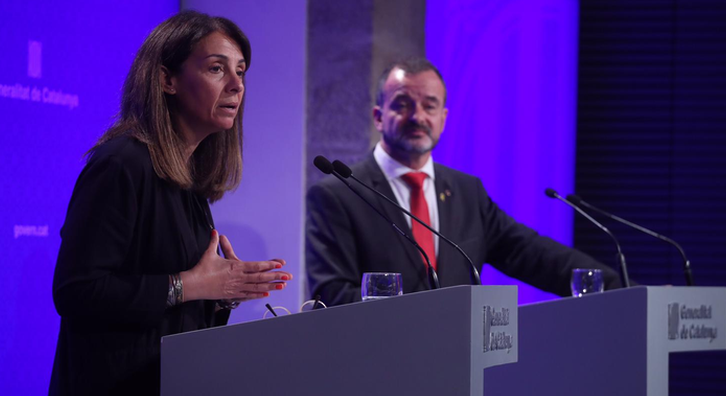- The Plan defines the priorities and objectives that will guide the Catalan government’s dealings with the European Union and foreign relations over the next four years
- The Strategic Plan involves coordination between all Catalan ministries
- The government has also approved the creation of three new delegations: in Tunisia, Argentina and Mexico

The Catalan government has given the green light to its Strategic Plan for Foreign Action and Relations with the EU 2019–22. At a press conference following a meeting of the executive, the Minister for Foreign Action, Institutional Relations and Transparency, Alfred Bosch, said the main aim was “to make Catalonia a known and recognised actor in the world, with greater presence and more of an economic, social and cultural impact, and to strengthen its reputation as a standard-bearer for democracy, peace and solidarity, because we’re a nation that wants to promote our ideals with respect to peace and human rights”.
The strategy document will serve as a roadmap for Catalonia to become an even more influential and highly regarded international actor. The Plan also coordinates the foreign action of Catalan ministries, establishing a stronger structure designed to optimise mechanisms such as inter-ministerial commissions and specific working groups. It is the first plan to cover the Catalan government’s participation in EU institutions and bodies, international bodies, and territorial cooperation networks.
According to Minister Bosch, the 2019–22 Plan is structured around four key pillars: presence in the world, excellence, influence and commitment. These broad priorities translate into 15 strategic objectives, which in turn give rise to 41 operational objectives at the sectoral level and a total of 127 actions. Each objective has specific assessment indicators.
The Plan gives the government the tools it needs to situate Catalonia and its plans for the future within the framework of the global agenda. Catalonia aims to strengthen its relations with the European Union and with the rest of the world and international bodies, and to bolster its commitment to the goals set out in the 2030 Agenda for Sustainable Development.
Government approves creation of new delegations in Tunisia, Argentina and Mexico
The government today approved the establishment of three new delegations abroad: the Catalan government delegation to Tunisia, based in Tunis; the delegation to Argentina, based in Buenos Aires; and the delegation to Mexico, based in Mexico City.
According to Minister Bosch, the creation of these offices abroad completes the “restitution phase”, which entailed reopening 12 delegations, most of them in Europe, that were shut down following the Spanish government’s application of Article 155. The minister said the government will now embark on an expansion on all the world’s continents.
“We have an obligation to ensure that Catalonia is present on every continent – that everyone can take an interest in Catalonia – and to open up the opportunities our citizens deserve.” The minister said the new delegations will facilitate Catalonia’s presence beyond the cities and countries where they are located, increasing its reach and visibility in surrounding regions: Central America in the case of the Mexico City office, the Southern Cone in the case of Buenos Aires, and the Maghreb in the case of Tunisia.
The sphere of action of the delegation to Tunisia will encompass all of North Africa, including Tunisia, Algeria, Morocco, Mauritania and Libya. The delegation to Argentina will promote and coordinate bilateral relations with authorities in Argentina, Paraguay, Uruguay and Chile, as well as facilitating the Catalan government’s trade promotion activities in other South American countries (Bolivia, Brazil, Colombia, Ecuador, Guyana, Peru, Suriname and Venezuela). Finally, the delegation to Mexico will also cover countries in Central America (Belize, Costa Rica, El Salvador, Guatemala, Honduras, Nicaragua and Panama) and the sovereign island nations of the Caribbean.